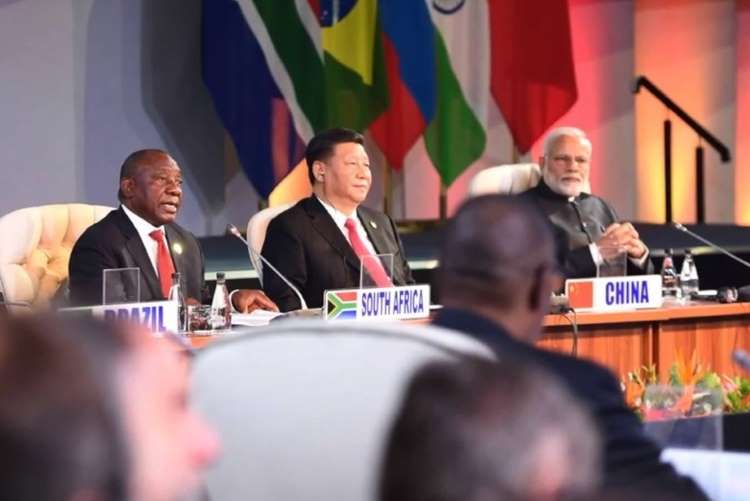
As the BRICS bloc of emerging market economies explores expansion by welcoming new members, India has shown reluctance towards Pakistan’s aspirations to join the group. New Delhi is poised to oppose Islamabad’s application as it is keen to preserve the emerging market focus of the grouping which also has Brazil, Russia, China, and South Africa. Egypt, Ethiopia, Iran, Saudi Arabia, and the United Arab Emirates also became members from January 1.
Pakistan, keen on becoming a full member, is engaging with Russia during its BRICS presidency, in hopes of gaining support. Additionally, Pakistan is actively seeking backing from other member nations including China. Russia inaugurated its presidency under the theme of ‘Strengthening Multilateralism for Equitable Global Development and Security’, signalling an openness to expanding the alliance. BRICS, in a significant move, invited six additional countries to join as members.
READ | Indian economy: Can the growth engine defy global headwinds?
BRICS in 2024
The expansion of BRICS has ignited debates about the bloc’s future direction. While welcoming new members like Saudi Arabia and the UAE could bolster its economic clout and diversify its perspectives, the sheer number of countries raises concerns about maintaining cohesion and coherence. Navigating the diverse interests and priorities of a larger group could pose significant challenges to decision-making processes. Furthermore, ensuring that new members align with BRICS’ core values and objectives will be essential for preserving its identity and preventing dilution of its purpose. The success of this expansion hinges on finding a delicate balance between inclusivity and unity, ensuring that BRICS retains its effectiveness as a collective force on the global stage.
India’s opposition to Pakistan’s candidacy is rooted in its desire to maintain BRICS as a consortium for emerging market economies. New Delhi argues that Pakistan’s inclusion would not significantly contribute to the group. Moreover, India harbours concerns about potential political complications, despite BRICS forums typically avoid bilateral issues. Given that new memberships require consensus, India hopes to block Pakistan’s accession.
While economic considerations play a major role in India’s stance, geopolitical tensions cannot be ignored. Pakistan’s inclusion in BRICS raises concerns about complicating the group’s dynamic, further exacerbated by existing frictions between certain members. China and India, for instance, often grapple with divergent stances on trade and regional security, casting a shadow over BRICS’ ability to present a unified front. Similarly, Russia’s recent foreign policy actions have drawn criticism from other members, creating internal fissures that could hinder effective collaboration. Addressing these divisions and finding common ground will be crucial for BRICS to truly fulfil its potential as a powerful economic and political alliance.
Over the past two decades, the global economic landscape has undergone a dramatic transformation, primarily fuelled by the ascent of China and India. The BRICS bloc has evolved into a more formal and institutionalised entity, hosting regular summits and establishing collective bodies. However, this growing influence has sparked criticism, particularly regarding the group’s endorsement of authoritarian state capitalism and its perceived challenge to the liberal order.
The dynamics within BRICS are poised for a significant shift. The group is considering expanding its membership in response to increased interest from numerous countries. This enlargement is aimed at bolstering the group’s economic clout and support its ambition to advocate for the Global South.
Some BRICS members, notably China and Russia, aspire to position the bloc as a counterbalance to Western influence. Russia and Iran, in particular, are united in their struggle against US-led sanctions and diplomatic isolation. The recent deepening of economic ties between these two countries in the aftermath of Russia’s invasion of Ukraine exemplifies this alignment. The inclusion of oil giants Saudi Arabia and the UAE underscores their shift away from the US and their aspirations for global prominence.
In contrast, India maintains strong connections with the United States and Europe. The disparity in economic scales and foreign policy objectives among member states poses a significant challenge to the bloc’s decision-making process. Despite ambitions to reduce dependence on the US dollar, such aspirations have yet to materialise. The New Development Bank, one of BRICS’s notable achievements, now faces challenges due to sanctions against Russia, one of its founding members. Representing approximately 40% of the global population and a quarter of the world’s GDP, BRICS continues to grapple with internal divisions, hindering its efficacy as a major global player and drawing criticism for its perceived inaction.
As Russia assumes the BRICS presidency in January, President Vladimir Putin announced plans to explore a new category of BRICS partner countries, potentially expanding the group’s multidimensional agenda. Both India and Pakistan are members of the South Asian Association for Regional Cooperation (SAARC) and the Shanghai Cooperation Organisation (SCO). However, SAARC’s functionality has been hampered by Indo-Pakistani tensions, as evidenced by recent disputes at SCO meetings.
